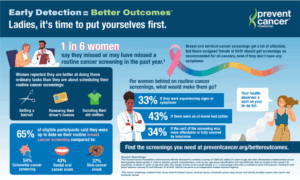Listen up, ladies: It’s time to put yourself first. Go to the doctor for routine cancer screenings before symptoms occur.

POUR DIFFUSION IMMÉDIATE
Kyra Meister
703-836-1746
kyra.meister@preventcancer.org
Alexandria, Va.—Do you only visit the doctor when you have an ache, pain or illness? For many women, the answer is “yes,” according to a récent sondage from the Prevent Cancer Foundation.®
The Foundation’s 2025 Early Detection Survey revealed that among women who are behind on at least one routine cancer screening, 33% said they would only go if they were experiencing signs or symptoms of disease.1
The situation is critical. One in six women say they missed or may have missed a routine cancer screening in the past year. In fact, women seem to be better about taking care of other aspects of their lives over their health, reporting they are better at doing ordinary tasks like getting a haircut, renewing their driver’s license or donating their old clothes than they are about scheduling their routine cancer screenings.
But this “only go when you have to” philosophy may be to their detriment.
“Early detection equals better outcomes, so we can’t wait until our bodies are screaming at us to check our health. Women need to prioritize their own health by going to the doctor even when everything feels fine,” said Jody Hoyos, CEO of the Prevent Cancer Foundation. “Routine checks and screenings provide an opportunity to stay ahead of cancer, so if there is an issue, you can deal with it before it becomes a bigger problem down the road.”
One of the major barriers to women getting routine screenings is worry about the screening exam itself. While 38% of women behind on their screenings said they’re worried about the possibility of discovering cancer, 29% reported being worried about experiencing pain or discomfort during the screening exam.
To address patient concerns, doctors can walk them through what their screening or check will be like, provide additional tips to minimize discomfort (like the best timing for your appointment or options for pain medicine beforehand), and most importantly, listen to patients if they express any pain or discomfort during the exam.
It’s also important for all women to remember that routine cancer screenings go beyond the screenings for what are typically thought of as “women’s cancers,” such as breast and cervical cancers. The Early Detection Survey showed women may be less aware of the need for some of these other screenings—65% of eligible participants said they were up to date on their routine breast cancer screenings, compared to their colorectal cancer screenings (54%), dental oral cancer exams (43%) and skin cancer checks (37%).
It’s time to change course and check all aspects of your health. Find out the screenings you need at every age at preventcancer.org/screening. To access resources for free or low-cost cancer screenings, visit prévenirlecancer.org/free.

Research Methodology: The Prevent Cancer Foundation commissioned Atomik Research to conduct a survey of 7,000 U.S. adults 21 years of age and older. Researchers implemented several demographic-based quotes in order to achieve ample characteristics, such as sex, age group classification, and race/ethnicity, that are similar to the overall U.S. population of adults 21 and older. The margin of error of the overall sample is +/- 1 percentage point with a confidence level of 95%. Fieldwork took place between January 22 and February 10 of 2025. Atomik Research is an independent market research agency.
1The cancer screenings studied in this survey were for cancer du sein, cancer du col de l'utérus, cancer colorectal, cancer du poumon, cancer de la bouche, cancer de la prostate, cancer de la peau et cancer des testicules.
###
À propos de la Fondation Prévenir le Cancer®
La Fondation Prévenir le Cancer® is the only U.S.-based nonprofit organization solely dedicated to cancer prevention and early detection. Through research, education, outreach and advocacy, we have helped countless people avoid a cancer diagnosis or detect their cancer early enough to be successfully treated. We are driven by a vision of a world where cancer is preventable, detectable and beatable for all.
La Fondation se mobilise pour relever le défi de réduire les décès par cancer de 40% d'ici 2035. Pour y parvenir, nous nous engageons à investir $20 millions dans des technologies innovantes pour détecter le cancer à un stade précoce et faire progresser le dépistage multi-cancer, $10 millions pour étendre le dépistage du cancer et la vaccination. l'accès à des communautés médicalement mal desservies et $10 millions pour informer le public sur les options de dépistage et de vaccination.
Pour plus d'informations, s'il vous plaît visitez www.preventcancer.org.